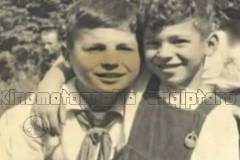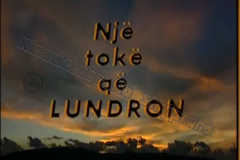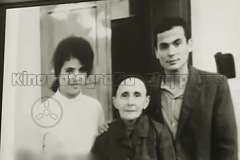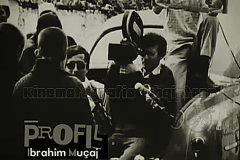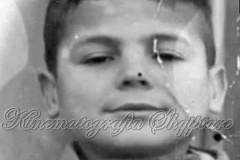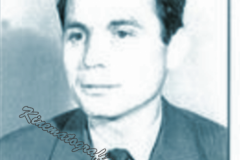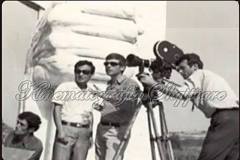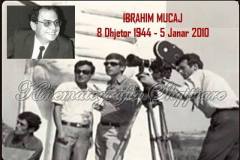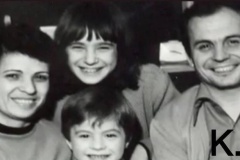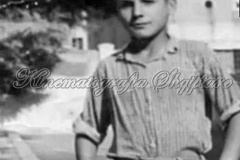Ibrahim Mucaj (1944 – 2010)
Director / Honored Artist.
A big name in Albanian directing, for feature films and documentaries.
Born in Vlora on December 8, 1944, where he completed secondary school. Mucaj graduated from the High Institute of Arts for acting in 1968, majoring in drama.
First worked at Kinostudio “Shqiperia e Re” as an assistant director in the films: “Bronze Bust” (1970) directed by Viktor Gjika, “When it dawns a day” (1971), “Conscience” (1972) by Hysen Hakan, “The Furrows” (1973) by Kristaq Dhamos and “Coats over wire fence” (1977) by Muharrem Fejzo.
As an independent director, he first made the documentaries: “New Song” (with M. Topallaj 1971) and “The life of a monument” (1974). Then he shoots “The Struggle for Bread”; “Drini changes its path again” etc.
Mucaj completed a post-graduate course in film directing at ILA and at Kinostudio. Later, his profile took the direction of Artistic Film and together with the other director Kristaq Mitro he cooperated for a long time around 25 years, creating a successful duo, the compatibility of ideas, concepts, findings and aesthetic treatments.
Thus in v. 1975 they write their first film “The Last Winter”, giving a story with a heroic and dramatic character from the national-liberation war. In this film, they both showed their mastery in the sensitivity to the frame, the contrast of the line of black dressed women in the white snow, the dynamics of the mise-en-scene and its poetics. A complement to this acting image was the soundtrack, the music, the silences, so much so that this film won the first prize at the 1st Albanian Artistic Film Festival, 1976.
Starting from this film, the two directors Mucaj-Mitro now set out towards the film with a tragic emotional and epochal character like “Bloody Land” (1976), the murder of Miti and his wife’s weeping, the murder of the miller proves the strong dramatic sense of the director.
Another historical plan is the film “Freedom or Death” (1979) dedicated to the warriors’ prominent captain’s platoon in Albanian history Cerciz Topulli, against the Ottoman hordes and the famous battle of Mashkullore. The majestic and monumental are contrasted by the directors mixed equally with simplicity, lyricism and intimacy, highlighting especially the moments of Cerciz’s meeting with his mother and wife.
From the films with the theme of the national war, Muca-Mitro directing stands out, the tension, the compression of the action and the drama such as. “The Bride and the Curfew” (1978), or “On the threshold of Liberty” (1981), based on the novel “Before Dawn” by Sh. Musaraj.
The movie “The Good Man” (1982), is known for the sharpness of social and moral conflict, without rhetoric and political pathos, showing psychological directions, and seeing the phenomenon of careerism as a social evil that destroys man and society itself. The same film won the First Prize and the Cup of the 5th Albanian Film Festival, 1983.
Almost the same theme is treated by the movies “Love your name” (1984) and “Appassionata” (1983). The intersection of a love line with a social and often political phenomenon reappears in the film “The Morning Phone” (1978), where the drama and courage to articulate a strong critique of the corruption of the authorities give dimension to the directorial idea.
The film “A Boy and a Girl” (1990) is the latest in collaboration with Kristaq Mitron, after which he resumes working as a director on his own in the shooting of documentaries, without losing the former theme of orientation towards social problems, as are a series of films shot in the period 1997 – 2004, with the despair of neglected and trampled people who do not find justice.
Thus we can mention the documentaries “A sailing land” (the serious event of the sinking of the ship in Otranto), “Desperately” (call to protect the created values), “Modern times” (the corrosive phenomenon of drugs and its consequences), “The flowers of a winter night” (sadness, melancholy and humanism that merge in the form of a solid structure on New Year’s Eve).
Together with his son, Irvin Mucaj realizes the short feature film “A wonderful day”(2003) where the anxiety is felt to respond to the life of an emigrant in all its difficulties.
Director I. Muçaj was the director of “Alba Film Studios”, 1995-1997, and then a lecturer at the Academy of Arts, and for some time Project Director at the National Cinematographic Center. Recently, the center approved the project of his film “The End of Illusion”, which would be a collaboration with his son, and which Irvine will probably now move forward alone.
Ibrahim Mucaj was decorated with the Order “Naim Frasheri” of the first class and holds the title “Merited Artist”. He passed away on January 5, 2010.

Published for the first time on the page “Albanian Cinema” (Facebook) in December 2013, revised in the following years.
___________________________
Albanian Cinematography in activity since 2013
Reference: Online – selection of information extracted from various Albanian newspapers and portals / “Encyclopedia, Theater and Albanian Cinematography” – Toena 2009 / Papagjoni. J / F. 310-311.
Follow us too: Blog: https://albaniancinematography.blogspot.com/ Facebook: https://www.facebook.com/ksh.faqjazyrtare Dailymotion: https://www.dailymotion.com/kinetografiashqiptareartisporti YouTube: https://www.youtube.com/channel/UCDRYQ5xCyGkfELm3mX8Rhtw
Discover more from Albanian Cinematography - Sport
Subscribe to get the latest posts sent to your email.

